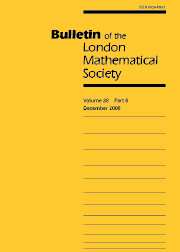Article contents
LINEAR SPACES ON CUBIC HYPERSURFACES, AND PAIRS OF HOMOGENEOUS CUBIC EQUATIONS
Published online by Cambridge University Press: 01 September 1997
Abstract
A remarkable theorem of Birch [2] shows that a system of homogeneous polynomials with rational coefficients has a non-trivial zero, provided only that these polynomials are of odd degree, and the system has sufficiently many variables in terms of the number and degrees of these polynomials. Despite four decades of effort, the problem of obtaining a reasonable bound for the latter number of variables has proved to be one of great difficulty. When the system consists of a single cubic form, Davenport [4] has succeeded in showing that 16 variables suffice, and Schmidt [17, 18, 19, 20] has devoted a series of papers to systems of cubic forms, showing in particular that 5140 variables suffice for pairs of cubic forms, and that (10r)5 variables suffice for systems of r cubic forms. The current state of knowledge for forms of higher degree is, by comparison, extremely weak (but see [21, 22]), and so it seems worthwhile expending further effort on the case of systems of cubic forms. In this paper we improve on Schmidt's result for pairs of cubic forms. In contrast with the sophisticated versions of the Hardy–Littlewood method employed by Davenport and Schmidt, our approach is based on an elementary idea of Lewis [12], and is applicable in arbitrary number fields. This method also has consequences for the existence of linear spaces of rational solutions on cubic hypersurfaces, thereby improving on work of Lewis and Schulze-Pillot [14] on this topic.
- Type
- Research Article
- Information
- Copyright
- © The London Mathematical Society 1997
- 10
- Cited by




